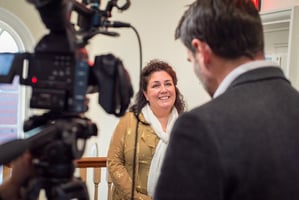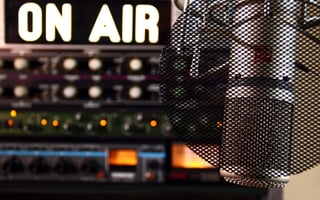The relationship between PRs and journalists has often been a bit strained. Journalists have often...
If you have been on one of our media training courses before, you will know that in the UK it is not advised to ask journalists for their questions ahead of an interview.
It is an approach that is likely to make journalists suspicious the spokesperson, and their organisation, has something to hide.
And, in the unlikely event they agreed to the request, there is a danger it would lead to an interview that sounds horribly scripted.
But what about asking for just the first question?
This is something where the thinking has typically been less clear cut.
I remember being told during my media training many years ago, that you should always ask for the first question. And, working in previous communication roles, it was information I tried to gain ahead of a media interview, with mixed success.
But I’ve also read and heard that it is something spokespeople and their PR advisors should not ask.
Current working journalists
So, to provide some clarity on the subject, we put the question to a select group of our current working journalist tutors.
All but one agreed it is ok to ask what the first question will be in an interview.
The general feeling among our tutors is that it can be a beneficial approach for all parties if the spokesperson is nervous.
Howard Bentham, one of the latest tutors to be added to our roster, said the question should only be asked “if the interviewee is hugely nervous ahead of a live broadcast interview and it is for a proactive, positive subject.” He added: “That way, the interviewee will get confidence and give a better performance for all concerned.”
Chris Maughan, offered a similar view, saying: “I usually sense that someone asking about the opening questions wants to perform well in their interview and this has to be a positive.
“If they are feeling nervous or anxious, asking about the opening question can help them make a strong opening to the interview.”
But this is where it starts to get tricky
While it seems that journalists are, on the whole, happy to be asked about their first question, there is no guarantee that it will be the opening question when the interview starts.
This does not mean journalists are looking to trip spokespeople up or that they are vindictive. It is just a reality that the focus of the story could alter or that the journalists get distracted by what else is going on and by the producers, editors and camera technicians also involved in the story.
Keme Nzerem said: “Even if I tell them what the first question is, I might change my mind anyway.”
Jane Deith added: “I don't mind them asking about the first question. However, I reserve the right to change my first question.”
And Chris Maughan said: “I remind those we train to be cautious about the opening question. There may be a lot going on in a TV or radio studio, the question finally asked may not be in the same words or same form that interviewee had expected.”
Thinking you know what the first question is going to be and then finding yourself facing something completely different, or worded unexpectedly, could easily cause a spokesperson to stumble and appear ill-prepared.
And it can be difficult to recover when an interview gets off to a bad start and the spokesperson feels unsettled. So, it is important to weigh up whether the potential reassurance about knowing what the first question is likely to be is worth the risk.
Charles Abel, another one of our tutors, believes that spokespeople should not get hung up on the first question and should instead focus on making sure they prepare properly.
He said: “A spokesperson should already know what they want to tell the audience, so my opening question really doesn't matter, apart from providing an opportunity to bridge.
“Having a ready-made answer also makes the interviewee sound wooden and inauthentic - the words are right, but nobody believes them.
“What a spokesperson and their advisors should ask, or know already, is the context of the interview, which is likely to give them a strong steer about what I'm after. This can come from looking at previous coverage, how the story is already flowing and what social media is saying.
So, asking what angle I'm looking for could be more useful.”
Susan Bookbinder was one tutor who was most against spokespeople asking about the opening question.
She says it signals that the spokesperson wants the journalist to drive the interview and that can lead them far away from the message they wanted to get across. And she recalled a cautionary tale.
She said: “When I was working at the ITV news channel, the Chief Economic Advisor to the US Government came into my studio and asked me what my first question was. I asked her why President Bush had left the poor and black community of New Orleans to die.
“The whole interview was spent on the matter of the President's failure to visit the flood devastated city, rather than the matter of toxic hedge funds and the oncoming global economic crisis.
“Had she simply told me that the world was facing a massive recession, I would have gladly asked her about that. But I didn't have access to this information and she asked me to set the agenda.”
So what does all this mean?
Well, in summary, you can ask a journalist what the question will be. And it can be helpful if a spokesperson is feeling particularly nervous.
In our experience, it is an approach that is probably better suited to the softer, feature-style interviews, where you and the journalist both know the content is strong. For example, let’s say you are a well-liked animal charity and you are giving a journalist access to your new facility. In this situation, it probably won’t hurt to ask about the first questions as there are unlikely to be so many distractions that could cause it to change.
But while it may feel reassuring to have a sense of what is to come during a strong news story, or when discussing a challenging subject, that security can create more risks than it solves.
As many of our tutors have said, it is much better to spend your time identifying the angle, the style of the interviewer, the nature of the programme and the profile of its audience.
From that solid foundation, you can prepare accordingly, select the appropriate tone and words, and deliver a confident performance.
Media First are media and communications training specialists with more than 35 years of experience. We have a team of trainers, each with decades of experience working as journalists, presenters, communications coaches and media trainers.




